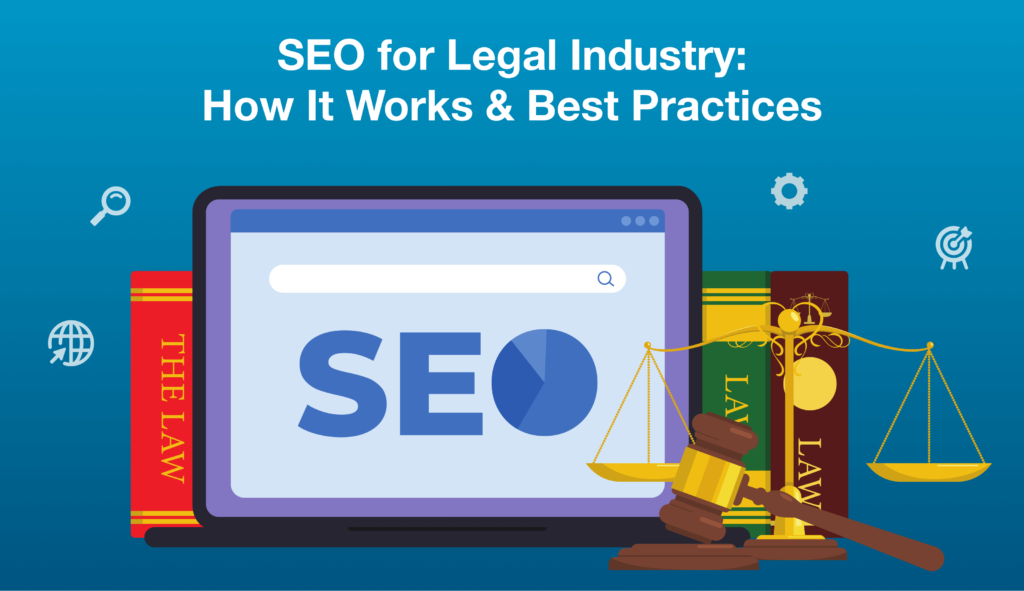Nowadays, anyone looking for legal representation will start their search in one place: the internet. More specifically, they’ll likely go straight to Google, the search engine handling 8.5 billion searches a day.
If you’re a lawyer, this is both good and bad. The good news is that it’s never been this easy to get in front of people who need your services. The bad news is that around 1.14 billion active websites compete for attention online, so it can be tough to stand out from the crowd.

Search Engine Optimization (SEO) is the process of optimizing your website to rank higher in search engine results pages and ultimately drive more traffic and clients to your website. This guide will show you how SEO works for lawyers and share some best practices for getting started with your legal SEO strategy.
So grab a cup of coffee, get comfortable, and let’s dive in.
What Is SEO (Search Engine Optimization)?
SEO is the process of enhancing your website to rank higher in search engine results pages (SERPs). The logic is simple: the higher your site ranks in the SERPs, the more likely people are to find it when they’re searching for the products or services you offer.
Let’s say you’re a law firm that provides legal form template with a free electronic signature. You want to rank for the keyword “legal forms” so that when people search for that term, your site comes up as the top result. If you can achieve this, you’re more likely to get clicks and traffic from organic (unpaid) search results. In return, this can help you generate more clients for your business.
What Makes SEO for Lawyers Different from Other Industries?
The legal industry is unique in several ways, affecting how SEO and SEO editing are done. Here are some of the key differences between SEO for lawyers and for other industries::
Legal industries usually market locally
Most legal services are local in nature. For example, if a client needs a divorce lawyer, you’re not going to search for one in a different city or state. You want to find someone who’s local so that you can easily meet in person. Or, if you need a lawyer for driving under the influence (DUI, they need to find one who’s licensed to practice in their state.
That’s why, as a law firm, you need to make sure you’re ranking for local keywords. This might include “divorce lawyer + city name” or “DUI lawyer + state name.” By optimizing for specific keywords, you can make sure you appear in the SERPs for people who are looking for a lawyer in your area.
Clients choose firms relevant to their legal problems
When people need a lawyer, they’re usually dealing with a specific legal issue. They might need a lawyer who specializes in criminal defense or personal injury, for example. This means that when searching for a lawyer, they’ll usually include keywords that reflect their specific problem.
This is important to remember when you’re doing your keyword research. In addition to general keywords like “criminal defense lawyer” or “personal injury lawyer,” you should also try to identify keywords that reflect the specific legal issues your potential clients might be facing. For example, if you’re a criminal defense lawyer, you might want to target keywords like “DUI lawyer” or “health care lawyer.”
There are numerous legal specializations
As you know, there are many different specializations within the legal industry. This can make it difficult to rank for general terms like “lawyer” or to know which keywords to target.
One way to overcome this is to focus on long-tail keywords that are more specific and targeted than general terms like “lawyer.” For example, instead of targeting “divorce lawyer,” you could target “divorce lawyer for high-asset divorces.” The long-tail keyword is more specific and targeted, and it’s also less competitive than the general term “divorce lawyer.”
Benefits of SEO for Law Firms
Increases the firm’s credibility
Once you start ranking high in the SERPs, people will perceive you as being more credible and trustworthy. In return, this can help you attract more clients who are looking for a credible law firm.
Improves website traffic flow
If you can get your law firm’s website to rank high in the SERPs, you’ll see an improvement in website traffic as well. More people will click on your website when they see it appear as a top result, which can ultimately lead to more clients for your business.
The graph below shows just how big an impact your SERP ranking can make. Even your position on the page matters when it comes to your Click Through Rate (CTR). The CTR rate is the percentage of people who click on your website in that position on the page. The first five slots on Google’s result pages account for over 67% of all clicks.
Increases conversions
If you can get more people to visit your law firm’s website, you’ll also see an increase in conversions, as more traffic generally leads to more conversions, which can help your business scale. The average website conversion rate is 2.35%, so if you’re not hitting this, you should consider improving your SEO efforts.
How to Integrate SEO for Law Firms
Examine and audit your law firm (SWOT analysis)
Before you can start implementing SEO strategies, you need to first take a step back and examine your law firm as a whole. This includes looking at your firm’s strengths, weaknesses, opportunities, and threats (SWOT). By doing this, you can identify areas where SEO can help your business.
For example, suppose you’re a small law firm specializing in environmental law that doesn’t have a lot of content about climate change, for example. In that case, you could use an SEO audit tool to target keywords related to climate change. This would help you attract more visitors to your website who are interested in this topic.
Identify your target audience’s intentions
What are your target clients searching for when they need legal assistance? By understanding their needs and wants, you can better target the right keywords that will help you attract them to your website.
Adjust your SEO campaign to meet clients’ needs
Your SEO campaign should be designed to meet the needs of your target clients. You need to target the right keywords, create relevant and useful content, and optimize your website for conversions. You must analyze your ROI regularly to ensure that your SEO campaign is effective and achieves the desired results.
Wondering how to measure ROI on content marketing? Consider using Google Analytics, platform that can help you track your website traffic andalso shows you how people are finding your website. This information can help determine which SEO strategies are working and which need improvement.
Verify your law firm on Google Business Profile
Google Business Profile is a free platform that allows businesses to verify their information with Google. This is important for law firms because it helps them appear in the local “3-pack” on Google Maps. The ”3-pack”, or Map Pack, is a map extension that showcases local businesses when someone searches for goods and services. It also allows you to manage your online reviews, which can benefit your business.
Simply create a free account and follow the verification process to get started. Once your law firm is verified, keep your information up-to-date and accurate. This will help you attract more clients and grow more efficiently.
Ensure NAP consistency
NAP stands for name, address, and phone number. It’s important to have consistent NAP information across all of your online channels, including your website, social media accounts, and directory listings. This will help you build trust with Google and improve your visibility in the SERPs.
Outsource an SEO agency for legal firms
Google’s search algorithm uses more than 200 factors to rank websites. While you can do some SEO on your own, it’s often best to outsource this task to an experienced and reputable SEO agency that understands these factors and how to use them efficiently. They will have the knowledge and experience needed to help you achieve the desired results. In addition, they can help you save time and money by doing the heavy lifting for you.
When choosing an SEO agency, be sure to do your research. Check out their website,read customer reviews, and ask for a proposal to get an idea of their services and prices.
Wrapping Up
Because SEO is a complex and ever-changing field, it’s important for law firms to understand the basics. By following the tips above, you can create a successful SEO campaign that will help you attract more clients and grow your business. Good luck, and happy optimizing!
About the author: Nick Brown is the founder & CEO of accelerate, a SaaS business and digital marketing agency who exclusively partners with enterprise tech companies to scale their SEO and content marketing. Nick has launched several successful online businesses, written and published a book and grown accelerate from a UK based agency that now operates across US, APAC and EMEA. He has written for sites like Krisp and RingCentral.


